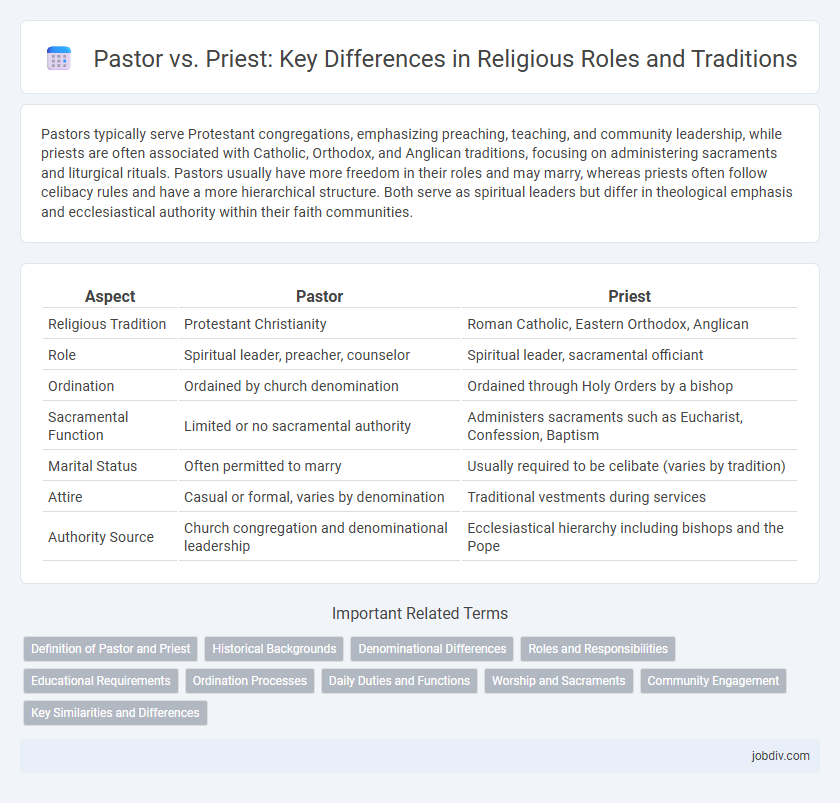Pastors typically serve Protestant congregations, emphasizing preaching, teaching, and community leadership, while priests are often associated with Catholic, Orthodox, and Anglican traditions, focusing on administering sacraments and liturgical rituals. Pastors usually have more freedom in their roles and may marry, whereas priests often follow celibacy rules and have a more hierarchical structure. Both serve as spiritual leaders but differ in theological emphasis and ecclesiastical authority within their faith communities.
Table of Comparison
| Aspect | Pastor | Priest |
|---|---|---|
| Religious Tradition | Protestant Christianity | Roman Catholic, Eastern Orthodox, Anglican |
| Role | Spiritual leader, preacher, counselor | Spiritual leader, sacramental officiant |
| Ordination | Ordained by church denomination | Ordained through Holy Orders by a bishop |
| Sacramental Function | Limited or no sacramental authority | Administers sacraments such as Eucharist, Confession, Baptism |
| Marital Status | Often permitted to marry | Usually required to be celibate (varies by tradition) |
| Attire | Casual or formal, varies by denomination | Traditional vestments during services |
| Authority Source | Church congregation and denominational leadership | Ecclesiastical hierarchy including bishops and the Pope |
Definition of Pastor and Priest
A pastor is a Christian leader who primarily serves as a shepherd to a congregation, providing spiritual guidance, teaching, and pastoral care within Protestant denominations. A priest is an ordained minister in Catholic, Orthodox, or Anglican traditions responsible for performing sacred rituals, administering sacraments, and mediating between God and the people. Both roles emphasize spiritual leadership but differ in function, doctrinal authority, and liturgical duties.
Historical Backgrounds
Pastors emerged primarily within Protestant traditions during the Reformation, emphasizing personal Bible study and congregational leadership, whereas priests originate in the Catholic, Orthodox, and Anglican churches with sacramental and liturgical responsibilities rooted in apostolic succession. Historical developments show pastors as shepherds responsible for teaching and guiding believers, while priests serve as mediators conducting the Eucharist and other sacraments. The distinction reflects broader theological divergences between Protestant emphasis on direct access to God and Catholic sacramental mediation.
Denominational Differences
Pastors typically lead Protestant congregations, emphasizing personal faith and scriptural preaching, while priests serve in Roman Catholic, Orthodox, and some Anglican churches, focusing on sacramental duties and liturgical roles. Denominational differences highlight that pastors often have the freedom to marry and play a more community-oriented role, whereas priests usually undergo celibate, formal training and serve as mediators of the sacraments. The distinction also reflects theological nuances, where pastors prioritize scripture and congregational governance, and priests uphold tradition and ecclesiastical hierarchy.
Roles and Responsibilities
Pastors primarily lead Protestant congregations, focusing on preaching, teaching, and providing spiritual guidance, while priests serve in the Catholic, Orthodox, and Anglican traditions, administering sacraments such as the Eucharist and confession. Pastors often engage in community outreach and pastoral care, whereas priests have a distinct role in liturgical ceremonies, including the celebration of the Mass. Both roles require deep theological knowledge and a commitment to nurturing the spiritual growth of their congregants.
Educational Requirements
Pastors typically undergo theological education through seminaries or divinity schools, earning degrees such as a Master of Divinity, which emphasizes pastoral care, counseling, and church leadership. Priests, especially in the Roman Catholic tradition, receive extensive formation that includes philosophy and theology studies, often culminating in a Bachelor or Licentiate in Sacred Theology, along with rigorous spiritual and pastoral training. The educational requirements for priests are generally longer and more formalized, reflecting their sacramental roles and commitments within the church hierarchy.
Ordination Processes
Pastor ordination typically involves a formal examination and approval by a denominational board, emphasizing theological education and personal calling, often within Protestant traditions. Priest ordination, especially in the Catholic and Orthodox churches, requires the sacrament of Holy Orders, including extensive seminary training, rites, and apostolic succession validation. Both processes underscore a spiritual commitment but differ in ritual complexity and ecclesiastical authority.
Daily Duties and Functions
Pastors primarily provide spiritual guidance, lead worship services, and offer counseling within Protestant communities, while priests conduct sacramental ceremonies, such as Eucharist and confession, mainly in Catholic and Orthodox traditions. Pastors often engage in community outreach and sermon preparation, emphasizing teaching and personal connection with congregation members. Priests also maintain church rituals and administer sacraments, upholding liturgical traditions and church doctrine.
Worship and Sacraments
Pastors typically lead congregational worship with an emphasis on preaching and interpreting Scripture, often within Protestant traditions, whereas priests perform sacramental rites such as the Eucharist and confession, primarily within Roman Catholic, Orthodox, and Anglican churches. The administration of sacraments like baptism, communion, and marriage is central to a priest's role, symbolizing grace through sacred rituals. Pastors may also oversee sacraments but usually stress communal worship and spiritual guidance over formal liturgical functions.
Community Engagement
Pastors typically engage deeply with their congregations through personalized counseling, community outreach programs, and leadership in local events, fostering strong relational bonds. Priests often serve as sacramental officiants within liturgical traditions, providing spiritual guidance and maintaining community rituals that unite parish members. Both roles emphasize community engagement, but pastors prioritize ongoing, direct interaction while priests focus on sacramental presence and church-centered activities.
Key Similarities and Differences
Pastors and priests both serve as spiritual leaders responsible for guiding congregations, conducting religious services, and providing pastoral care, with their roles rooted in faith-based community leadership. Pastors typically lead Protestant churches and emphasize preaching and personal relationship with congregants, while priests generally serve in Catholic or Orthodox traditions, administering sacraments like the Eucharist and maintaining liturgical rituals. Both roles require theological education and ordination, but their functions, denominational affiliations, and sacramental authority highlight key distinctions in Christian ministry.
Pastor vs Priest Infographic

 jobdiv.com
jobdiv.com